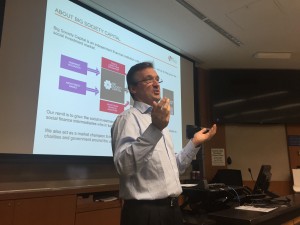 During his visit to campus in December, Nick O’Donohoe, CEO of Big Society Capital, provided insight into the founding of the organization and its role in building the social investment market in the United Kingdom. Impact investing (as we know it in the US) or social investing (as it’s often termed in the UK) strikes a balance between addressing societal challenges while generating financial return for investors.
During his visit to campus in December, Nick O’Donohoe, CEO of Big Society Capital, provided insight into the founding of the organization and its role in building the social investment market in the United Kingdom. Impact investing (as we know it in the US) or social investing (as it’s often termed in the UK) strikes a balance between addressing societal challenges while generating financial return for investors.
Big Society Capital is an impact investing pioneer – the first financial institution of its type in the world, established by the UK government in 2012. Big Society Capital’s innovative approach combines capital reclaimed from dormant bank accounts with capital from leading UK banks and puts that money to work for the benefit of society.
To that end, Big Society Capital plays two important roles. First, it acts as an investment wholesaler by making capital available to intermediary organizations who are working with social enterprises seeking capital. Second, Big Society Capital acts as a champion for the impact investing market by fostering this intermediary layer, building awareness and confidence among mainstream investors, and working with the government to promote best practices and establish policies for supporting this market. This model of serving as both a market champion and investment wholesaler has provided a blueprint for other countries to follow across the world.
Nick spoke about the successes and challenges he has seen in the impact investment market in the UK, in the US, and more broadly in the world. Three notable takeaways from his visit are:
- The intermediary layer is critical in the impact investing market, and a large wholesaler can foster that intermediary layer. Nick was unequivocal in saying that the most important element of market development is the intermediary layer – in this case, the investment managers, advisors, etc. who invest in and work with social enterprises. As the largest wholesaler in the market, Big Society Capital has helped to build the infrastructure of data and expertise around these intermediaries and has supported their work by making a large pool of capital available to them. With this support, the layer of smaller intermediaries is able to grow and demonstrate success, attracting more investors to the space.
- Those in the impact investing field need to be bilingual – to speak impact and finance. The impact investing space attracts diverse experts and practitioners, some with primarily financial backgrounds and others with primarily social impact backgrounds. Across these diverse players, important terms are sometimes used very differently. For example, Nick pointed out that even the word “investment” can mean different things to different players. In a field where collaboration between financial experts, social impact experts, and policymakers is so critical, we need players in the market who are “bilingual” and can translate the priorities between the more finance-focused and impact-focused groups and find common avenues for success.
- The biggest challenge that remains is in impact measurement. Nick was frank in stating that the most persistently difficult piece of the work in this field is in measuring and valuing impact, and it is the piece that he believes we have made the least amount of progress on to date. To scale the impact investing field to the size needed to solve persistent social challenges, we need real evidence that we are changing lives. Unfortunately, it is incredibly difficult to gather that data, and thus in its absence investors often have to rely on anecdotes of impact. But as Nick pointed out, no amount of anecdote adds up to evidence. In addition, even if we could gather perfect data on the outcomes social enterprises are achieving, it is inherently difficult for the field to connect that impact to a monetary value because everyone feels differently about different types of impacts – for example, each person may assign a different dollar value to an additional gallon of clean water provided to a child.
As we look forward to watching how the impact investing market continues to develop in the UK and globally, Nick’s comments illuminate the areas current players in the field need to focus, as well as the skills needed by those looking to enter this field. You can view Nick’s full talk on the CASE YouTube channel.
Article by Carrie Gonnella, Program Director of CASE i3, and Roxane Herrera, 2017 MBA Candidate at The Fuqua School of Business at Duke University
This article originally appeared on the CASE Blog.
